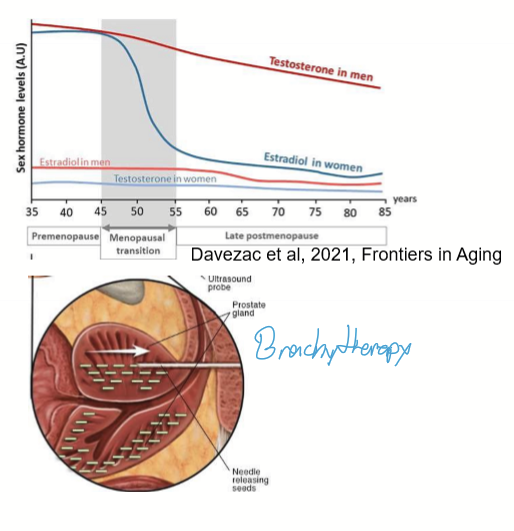20. Solid Tumors
1/51
There's no tags or description
Looks like no tags are added yet.
Name | Mastery | Learn | Test | Matching | Spaced |
|---|
No study sessions yet.
52 Terms
What are some solid primary cancers of the eye?
Basal cell carcinoma
Squamous cell carcinoma
Cutaneous melanoma
Uveal melanoma
Retinoblastoma
Epidemiology of skin cancer
light eye color: 1.8x risk
fair skin: 1.8x risk
inability to tan: 1.6x risk
Types of skin cancer:
basal cell carcinoma
squamous cell carcinoma
cutaneous melanoma
Basal cell carcinoma are what?
Cancer of epidermal basal cells. It is the most common skin cancer, 90% of all cases. They are slow growing, rarely metastatic, and rarely causes death.
What are the presentations of basal cell carcinoma?
asymptomatic
Pearly nodule (shiny)
Extensive invasion w/o treatment
Prominent telangiectasia (umbilicated bleeding center= ulcer)
Disrupt lid margin (disfiguring)
Madarosis (loss of lashes)
How is basal cell carcinoma treated?
Excisional biopsy
wide margins
r/o squamous cell carcinoma
What is squamous cell carcinoma?
Cancer of squamous cell/epidermal keratinocytes. is 2nd most common skin cancer of eye. Squamous cell carcinoma as group most found in ocular region. 5% risk of metastasis.
What are the presentation of squamous cell carcinoma?
Chalazion-like nodules from meibomian gland of tarsal plate and upper eye lid
Greasy: yellow or gray
Painful
Telangiectasi: ulcerate easily
Disrupt lid margin: disfiguring
Madarosis
Can metastasize with only 20% 5yr survival
Where does the squamous cell carcinoma metastasize to?
Orbit and/or intracranial cavity
What is a Nevi/Nevus?
Benign tumor/birthmark, beauty mark, or mole. It is a proliferation of melanocytes
What is cutaneous melanoma?
Cancer of melanocytes. 3rd most common skin cancer and #1 cause of skin-cancer related deaths.
What are the ABCDE’s Diagnostic criteria for melanoma?
A= asymmetrical
B= border irrgularity
C= color variation
D= diameter >6mm
E= evolving
What are the types of cutaneous melanoma?
superficial spreading
nodular
lentigo maligna
acral lentigious
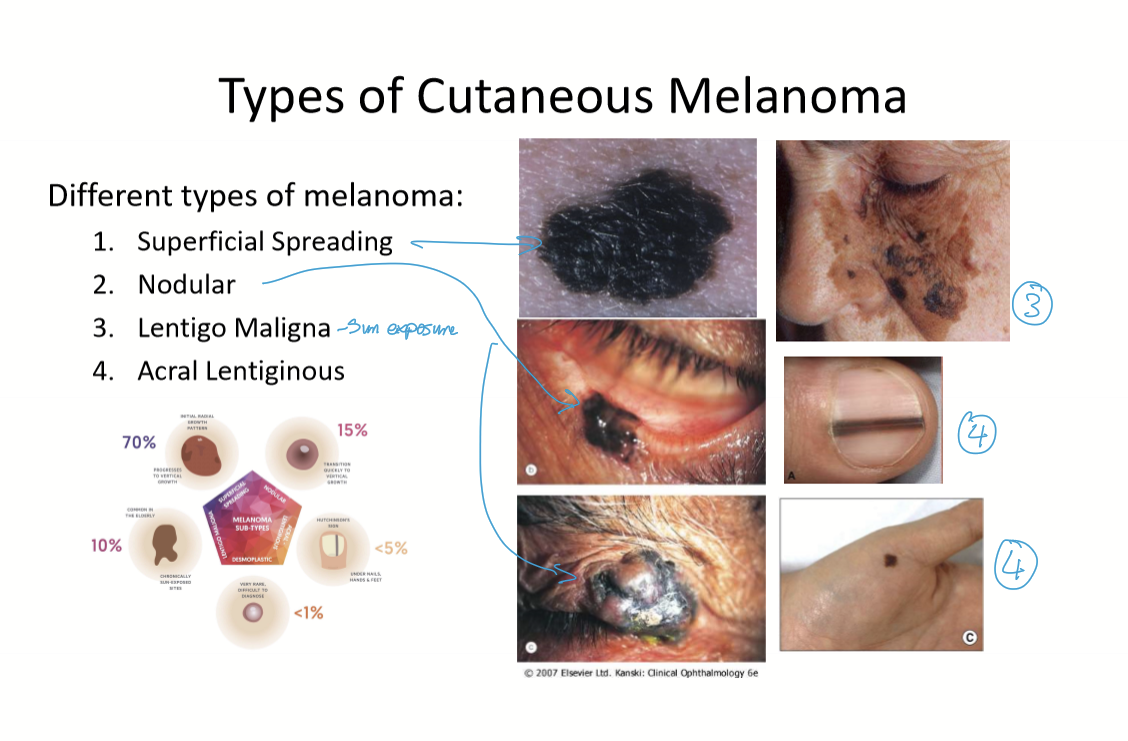
What is a concern about cutaneous melanoma?
Highly metastatic: hematogenous spread
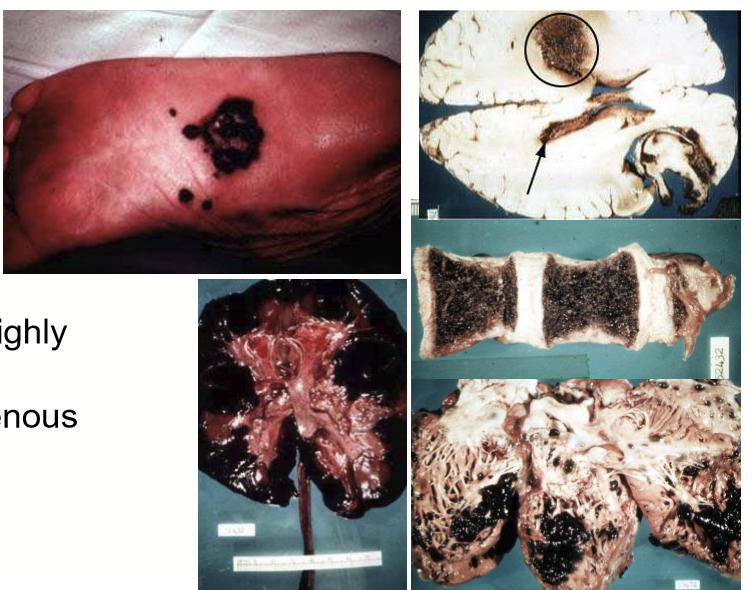
What antibody can be used to treat cutaneous melanoma?
Ipilimumab(Yervoy). Prevents apoptosis of CTLs by blocking CTLA-4 activation. Allowing CTLs to kill cancer and cause inflammation. Only 14.4% response rate with a 80% 5yr survival.
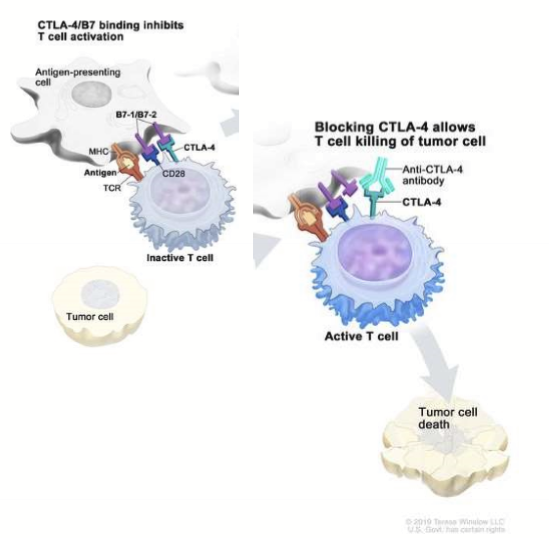
What are the side effects of Ipilimumab (Yervoy)?
Inflammation
Uveitis
Eye pain
Dry eye
Allergy response
What are some other treatments for cutaneous melanoma?
Immunotherapy: PD-1 blockade: Pembrolizimab (keytruda). PD-1 Ligand interacts with CTL, causing it to undergo apoptosis. Pembrolizumab binds to PD1 or PD1-L and inhibits interaction with CTLs. CTLs do not apoptose and kill melanoma.
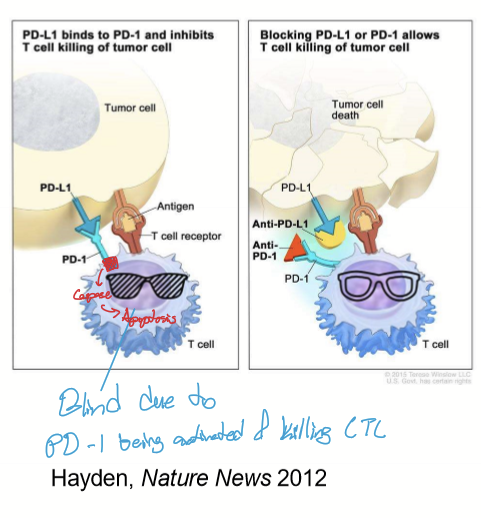
What happens when CTLA-4 and PD-1 blockade are combined?
Longer survival rate
Where is Uveal melanoma found?
95% in uveal tract
4% in conjunctiva
1% in eyelid/orbit
Is the #1 intraocular cancer in adults.
Where do uveal melanoma home towards?
Liver
Where are uveal melanomas found in?
choroid: often asymptomatic
iris
ciliary body
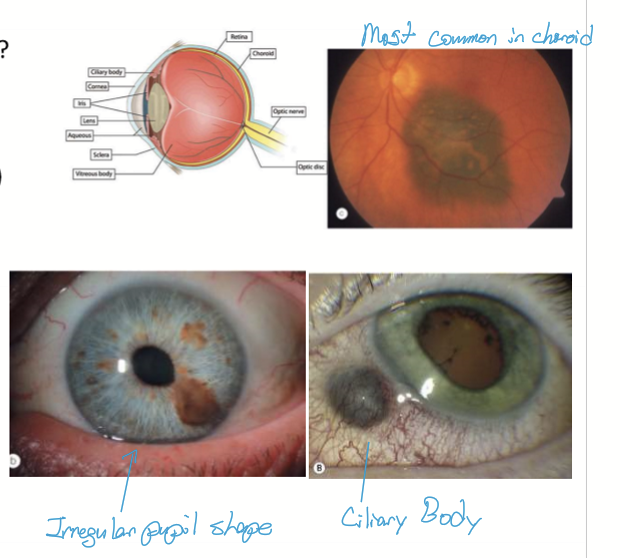
What is the difference between a nevus and uveal melanoma?
Nevus: low risk, drusen, RPE atrophy, no growth
Uveal melanoma: high risk, looks young, no drusen, growth, orange pigment, subretinal fluid.
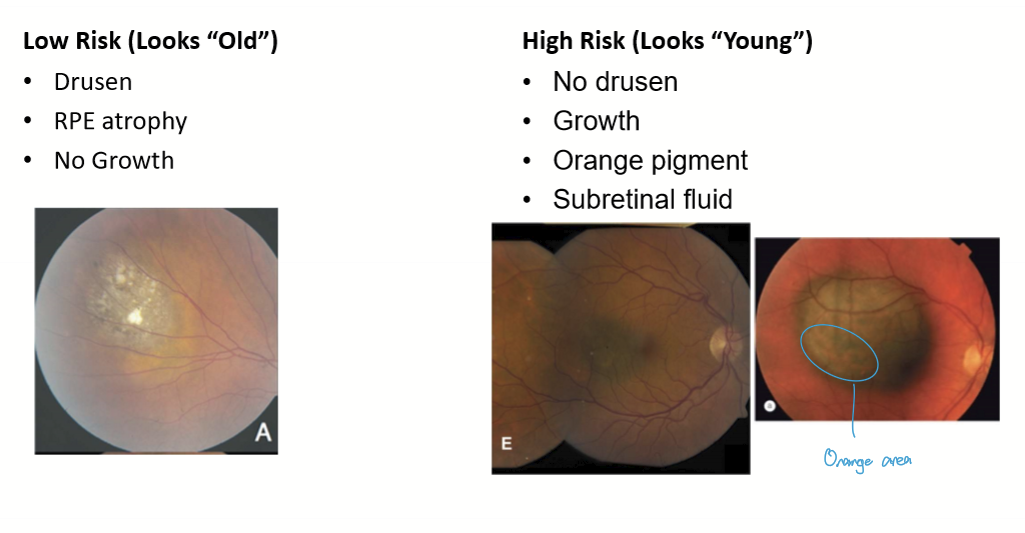
What are the treatments for uveal melanoma?
Radiotherapy for choroidal melanoma: Particle beam radiotherapy or plaque radiotherapy
No chemotherapy
Surgery: resection, enucleation, exenteration
Immunotherapy: CTLA4 blockade and PD1 blockade
What is unique about choroidal melanoma?
It is very hardy,
Complications of brachytherapy?
Cataracts
Chorioretinal scarring & retinal detachment
Radiation retinopathy: neovascularization
What is retinoblastoma?
Cancer of horizontal interneurons from RB1 mutation. Most common intraocular cancer in children
What are the clinical presentations of retinoblastoma?
Leukocoria: white pupillary reflex
Strabismus
Vision loss
If diagnosed early, 95-99% 10yr survival.
Metastasizes after 1 year
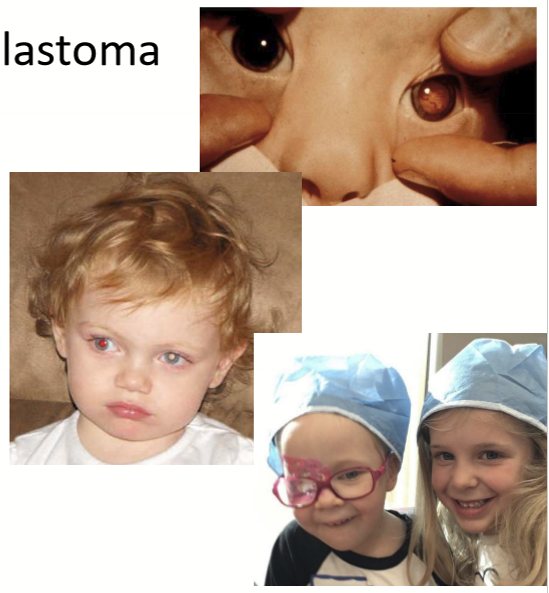
Are metastatic cancers more common than primary cancers?
Yes, metastatic in the brain is 10x more common than primary.
Where do most metastatic tumors of the eye and surrounding tissues come from?
Breast
Lung
Prostate
Lymphoma (with leukemia presentations)
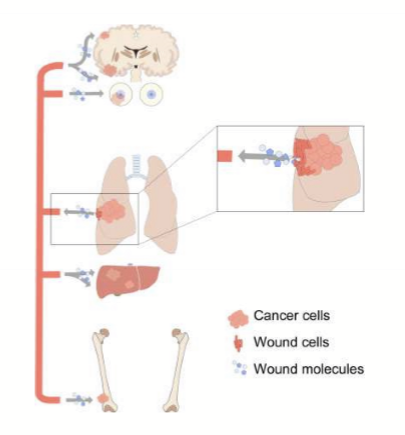
Why do we need to biopsy the ocular tumors?
To determine the location of primary tumor and receive correct treatment for the specific primary tumors.
What is the 2nd most common caner in men and women?
Lung caner. It is also the leading cause of cancer-related deaths
Why does lung cancer have such poor survival rates?
Fearful smokers
Poor screening
Mimics other respiratory diseases
How does lung cancer spread?
Lymphogenous and hemotogenous.
What are the 2 major classes of lung cancer?
85% non-small cell carcinoma: can be associated with horner’s syndrome. is least aggressive and poor survival.
10-15% small cell carcinoma (oat cell): paraneoplastic endocrine problems: ACTH, PTH, SIADH, Aldosterone. Most aggressive: 5% 5 yrs survival.
What treatments are used for non-small cell carcinoma?
Resection
PD1 blockers
What treatments are used for small cell carcinoma?
PD1 blockade
What is the leading cause of cancer in women?
Breast cancer.
What is the epidemiology of breast cancer?
FHx (genetic component): Ashkenazi jew, BRCA1/BRCA2 positive
Early menarche/last menopause= longer exposure to estrogen and progesterone
Nulliparous >35 yrs old= never had a full-term pregnancy. Pregnancy causes terminal differentiation of breast tissue.
What are the key structures of of the breast?
Lobules: produce and store milk
Ducts: milk ejection
Estrogen is a trophic factor for tissue changes; tissue enlarges before menses and recede during or after
What can mimic breast cancer?
Benign cysts. Location does not change, size may vary.
What are the 2 types of breast cancer?
Ductal carcinoma in situ (DCIS)
Lobular CIS (LCIS)
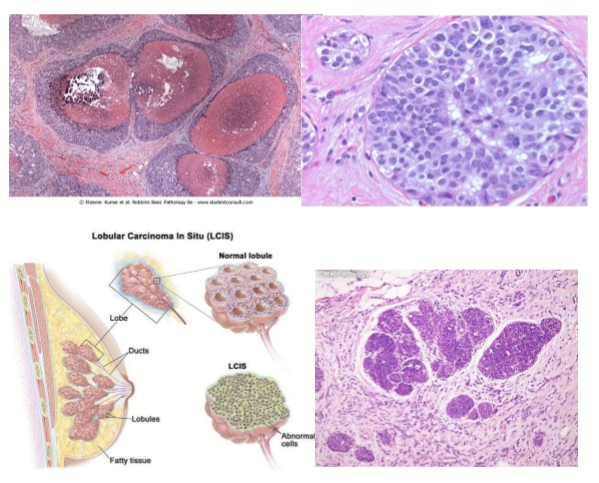
What is the prognosis of breast cancer?
nonmetastatic = 98% at 5 yr survival
metastatic= 25% at 5 yrs
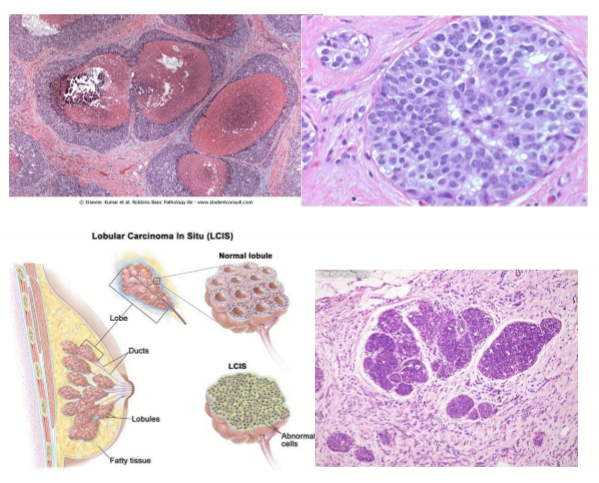
What treatments are used for breast cancer?
Based on subtype of breast cancer:
Excisional biopsy
Lumpectomy: with lymph node removal
Mastectomy: w/ or w/out reconstruction
Estrogen and progesterone receptors blockers
Tamoxifen: blocks estrogen receptors
Aromatase inhibitors: blocks production of estrone: in postmenopausal women and in men.
Blocking tumors with Herceptin (anti-Her2) antibodies: Her2/Neu, tyrosine kinase receptors, stimulates cell growth and division
What types of breast cancers are difficult to treat?
Triple negative (15-20%): no Estrogen receptors, no progesterone receptors, no Her2/Neu.
What is the most common cancer in men?
Prostate cancer. 3rd cancer-related deaths. 1 in 9 men diagnosed. 1 in 41 men die.
What is the function of the prostate?
Produces 40% seminal fluid fluid to nourish and transport sperm
What does testosterone do to the prostate?
Trophic factor, causing it to grow.
What are the key structures of the prostate?
Surrounds urethra
Anterior to rectum: digital rectal exam
Epidemiology of prostate cancer:
Age 60+
Black
FHx: BRCA1/BRCA2
What is benign prostatic hyperplasia (BPH)
A common condition in men where the prostate gland grows larger than normal. It does not increase risk for cancer and can mimic cancer presentation.
Presentation of Prostate Cancer:
Asymptomatic
If symptomatic:
Urinary presentation: interruptions
diminished stream
Blood in semen/urine
Erectile dysfunction (ED)
Perineal pain
Bone pain/renal
Treatment for prostate cancer
watchful waiting with surveillance
Target therapy: Androgen deprivation therapy
Radiation or brachytherapy
Nerve-preserving radical prostatectomy
